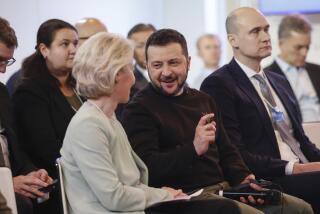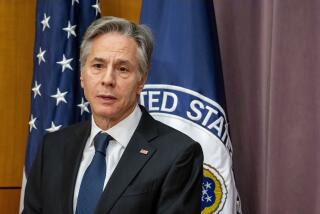Unease at the Summit
Bill Clinton and Boris Yeltsin, two presidents in political straits, will be looking past each other during today’s summit in Moscow, the American to financial market jitters at home and the Russian to an assault on his authority at the Kremlin. Neither can do much immediately about these predicaments, but together they should at least speak forcefully about the future of Russia and its advent upon the capitalist road.
Yeltsin’s struggle is closely bound to his determination to reach some level of Western-style democracy. Despite his many political and personal troubles, he has shown the courage and good sense to make some tough choices, for instance devaluing the Russian ruble. This is tough medicine and he is paying the price. Monday, for instance, Yeltsin’s Communist and ultranationalist opponents in the Duma, Russia’s parliament, once again refused to confirm his choice, Viktor S. Chernomyrdin, as prime minister, and Yeltsin immediately nominated him again. The Communists are playing a power game, seeking ministerial positions for their own candidates, a gambit that would split executive power in Russia at a time when it needs a strong line.
For Russia to shake off the corrupt power-dealing that characterized the long decades of Soviet Communism, Moscow must speak with a single voice to the outside world. That’s precisely the message that President Clinton is carrying. The United States and other Western countries and international financial agencies are prepared to work only with a Kremlin that delivers on its promises. The International Monetary Fund has already signaled that further installments on a $22.6-billion support package could be jeopardized by uneven progress on reforms.
In large part the future lies with the Russian people. They have tasted capitalism and it suits them, but they have also seen the bitter results of corruption in the system. Yelt-sin must move forcefully to clean up private-sector abuses and face the fact that without strong regulatory controls even the bad old days might look good.
“The Russian people are . . . having some troubles today making the transition from Communism to a free-market economy,” Clinton told students at a Virginia school before embarking on his trip. “What I want to do is go there and tell them that the easy thing to do is not the right thing to do.”
This is not a trip that Clinton had to take; Yeltsin’s problems are his own, and Kremlin and White House officials at a lower level could have competently dealt with the issues. But it could be a trip that serves Clinton in terms of appearing presidential during a tough political patch. It also gives him the opportunity to sell capitalism and democracy in Russia, a pitch that should please President Yeltsin and perhaps rattle his enemies.
More to Read
Sign up for Essential California
The most important California stories and recommendations in your inbox every morning.
You may occasionally receive promotional content from the Los Angeles Times.










